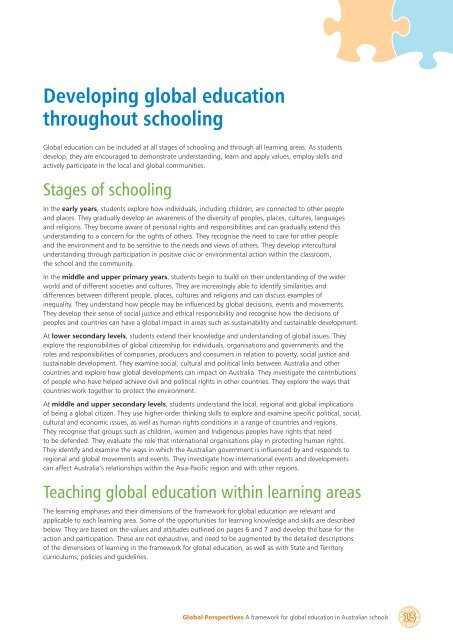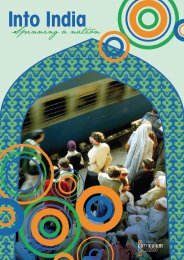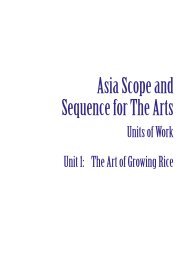A framework for global education in Australian schools
A framework for global education in Australian schools
A framework for global education in Australian schools
You also want an ePaper? Increase the reach of your titles
YUMPU automatically turns print PDFs into web optimized ePapers that Google loves.
Develop<strong>in</strong>g <strong>global</strong> <strong>education</strong><br />
throughout school<strong>in</strong>g<br />
Global <strong>education</strong> can be <strong>in</strong>cluded at all stages of school<strong>in</strong>g and through all learn<strong>in</strong>g areas. As students<br />
develop, they are encouraged to demonstrate understand<strong>in</strong>g, learn and apply values, employ skills and<br />
actively participate <strong>in</strong> the local and <strong>global</strong> communities.<br />
Stages of school<strong>in</strong>g<br />
In the early years, students explore how <strong>in</strong>dividuals, <strong>in</strong>clud<strong>in</strong>g children, are connected to other people<br />
and places. They gradually develop an awareness of the diversity of peoples, places, cultures, languages<br />
and religions. They become aware of personal rights and responsibilities and can gradually extend this<br />
understand<strong>in</strong>g to a concern <strong>for</strong> the rights of others. They recognise the need to care <strong>for</strong> other people<br />
and the environment and to be sensitive to the needs and views of others. They develop <strong>in</strong>tercultural<br />
understand<strong>in</strong>g through participation <strong>in</strong> positive civic or environmental action with<strong>in</strong> the classroom,<br />
the school and the community.<br />
In the middle and upper primary years, students beg<strong>in</strong> to build on their understand<strong>in</strong>g of the wider<br />
world and of different societies and cultures. They are <strong>in</strong>creas<strong>in</strong>gly able to identify similarities and<br />
differences between different people, places, cultures and religions and can discuss examples of<br />
<strong>in</strong>equality. They understand how people may be <strong>in</strong>fluenced by <strong>global</strong> decisions, events and movements.<br />
They develop their sense of social justice and ethical responsibility and recognise how the decisions of<br />
peoples and countries can have a <strong>global</strong> impact <strong>in</strong> areas such as susta<strong>in</strong>ability and susta<strong>in</strong>able development.<br />
At lower secondary levels, students extend their knowledge and understand<strong>in</strong>g of <strong>global</strong> issues. They<br />
explore the responsibilities of <strong>global</strong> citizenship <strong>for</strong> <strong>in</strong>dividuals, organisations and governments and the<br />
roles and responsibilities of companies, producers and consumers <strong>in</strong> relation to poverty, social justice and<br />
susta<strong>in</strong>able development. They exam<strong>in</strong>e social, cultural and political l<strong>in</strong>ks between Australia and other<br />
countries and explore how <strong>global</strong> developments can impact on Australia. They <strong>in</strong>vestigate the contributions<br />
of people who have helped achieve civil and political rights <strong>in</strong> other countries. They explore the ways that<br />
countries work together to protect the environment.<br />
At middle and upper secondary levels, students understand the local, regional and <strong>global</strong> implications<br />
of be<strong>in</strong>g a <strong>global</strong> citizen. They use higher-order th<strong>in</strong>k<strong>in</strong>g skills to explore and exam<strong>in</strong>e specific political, social,<br />
cultural and economic issues, as well as human rights conditions <strong>in</strong> a range of countries and regions.<br />
They recognise that groups such as children, women and Indigenous peoples have rights that need<br />
to be defended. They evaluate the role that <strong>in</strong>ternational organisations play <strong>in</strong> protect<strong>in</strong>g human rights.<br />
They identify and exam<strong>in</strong>e the ways <strong>in</strong> which the <strong>Australian</strong> government is <strong>in</strong>fluenced by and responds to<br />
regional and <strong>global</strong> movements and events. They <strong>in</strong>vestigate how <strong>in</strong>ternational events and developments<br />
can affect Australia’s relationships with<strong>in</strong> the Asia-Pacific region and with other regions.<br />
Teach<strong>in</strong>g <strong>global</strong> <strong>education</strong> with<strong>in</strong> learn<strong>in</strong>g areas<br />
The learn<strong>in</strong>g emphases and their dimensions of the <strong>framework</strong> <strong>for</strong> <strong>global</strong> <strong>education</strong> are relevant and<br />
applicable to each learn<strong>in</strong>g area. Some of the opportunities <strong>for</strong> learn<strong>in</strong>g knowledge and skills are described<br />
below. They are based on the values and attitudes outl<strong>in</strong>ed on pages 6 and 7 and develop the base <strong>for</strong> the<br />
action and participation. These are not exhaustive, and need to be augmented by the detailed descriptions<br />
of the dimensions of learn<strong>in</strong>g <strong>in</strong> the <strong>framework</strong> <strong>for</strong> <strong>global</strong> <strong>education</strong>, as well as with State and Territory<br />
curriculums, policies and guidel<strong>in</strong>es.<br />
Global Perspectives A <strong>framework</strong> <strong>for</strong> <strong>global</strong> <strong>education</strong> <strong>in</strong> <strong>Australian</strong> <strong>schools</strong> 13




